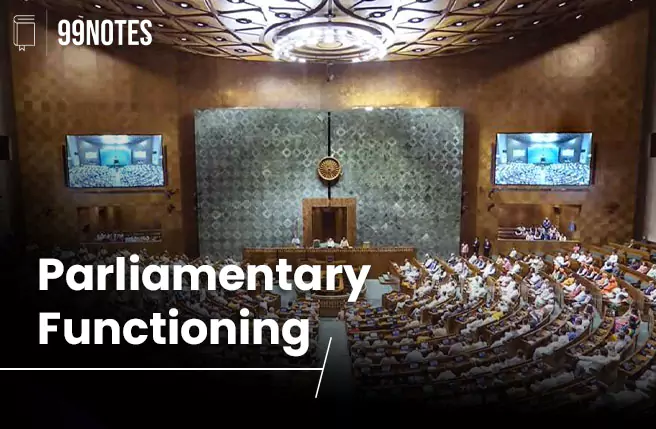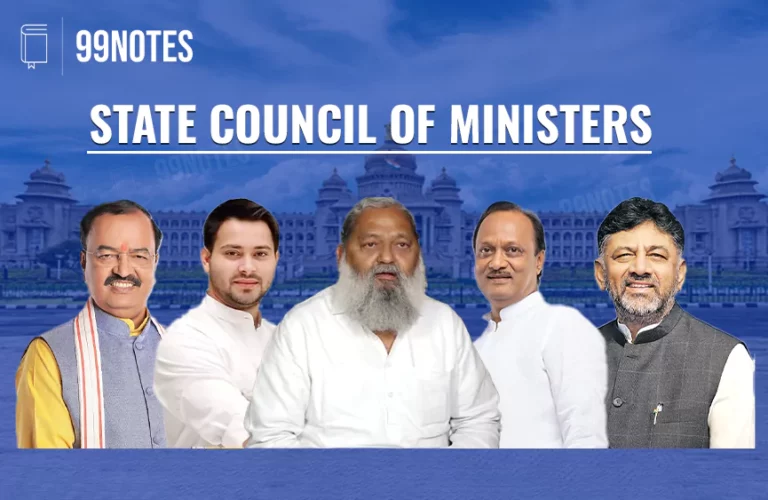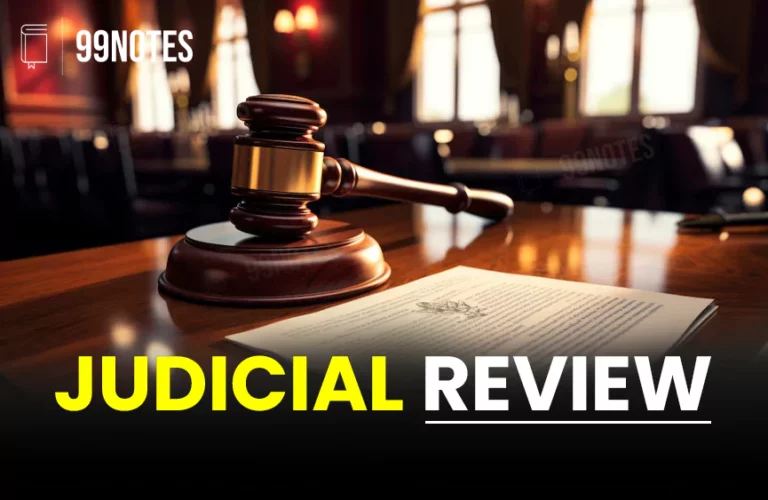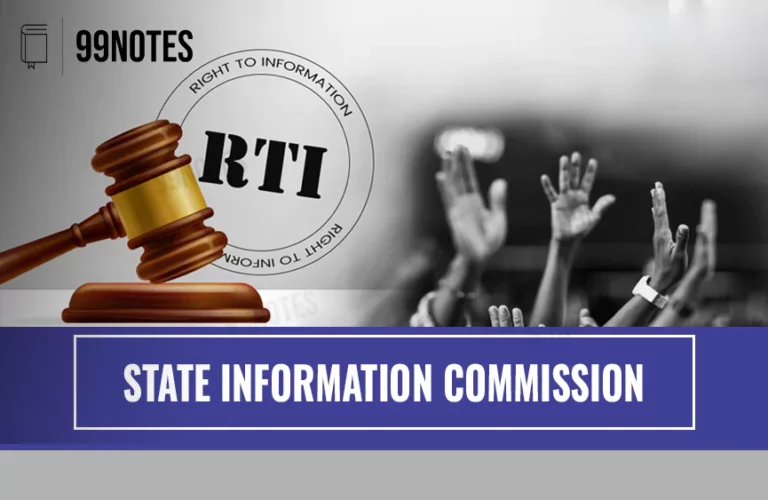Anti-Defection Law
| Defection |
|
In a political scenario, defection is a situation when a member of a political party leaves his/her party and joins hands with other parties. Traditionally, this phenomenon is known as ‘floor crossing’, which had its origin in the British House of Commons, where a legislator changed his/her allegiance when s/he crossed the floor and moved from the government to the Opposition side, or vice-versa. |
The anti-defection legislation was passed in 1985 through the 52nd Constitutional Amendment with the intent to curb “the menace of anti-defection”.
- For this, a tenth schedule was added to the Constitution. It contains provisions related to disqualification on grounds of defection.
- Legislators who quit their party after being elected or who disobey the leadership during a vote onany issue may be disqualified from the membership of the House under the anti-defection law.
Political Defections in India
- The phenomenon of political defections in India is not new; it has been a cause of political instability and uncertainty.
- The infamous term “Aaya Ram, Gaya Ram” was coined against the backdrop of incessant defection by legislators in the 1960s.
- According to the YB Chavan committee report (1969), the Indian political landscape between 1967 and 1968 was characterised by numerous defections; out of roughly 542 cases in the entire two-decade period between the First and the Fourth General Elections, at least 438 defections occurred in these 12 months alone.
- The desire for office played a major role in such defections; it is evident from the fact that out of 210 defecting legislators, 116 were part of the state council of ministers they helped to form.
- Even after the passing of the Anti-defection law, defections have not stopped, and there are demands for amending the existing act.
Provisions of the Act
- Grounds of disqualification of a member of a political party: A member of a House belonging to any political party will be disqualified if:
- If s/he voluntarily gives up the membership of such political party;
- If s/he votes or abstains from voting in conflict with the directions of the party without obtaining permission of such party and such voting or abstention has not been condoned by such political party.
- Grounds of disqualification of an independent member: If an independent member (not elected as a candidate of a political party) of a House joins any political party after his election, he is liable for disqualification under this law.
- Grounds of disqualification of an independent member: If a nominated member of a House joins a political party 6 months after s/he has taken his/he seat, then s/he is liable for disqualification on the grounds of defection. It means s/he can join any political party within 6 months of taking his seat without inviting disqualification.
Exceptions mentioned in the act
- In cases of Merger: A member of a House will not be disqualified if his/her original political party merges with another political party or a new political party is formed by such merger. [A merger takes place if 2/3rd of the members have agreed to such a merger].
- If a member is elected as presiding officer: If a member, after being elected as presiding officer of the House, voluntarily gives up the membership of the party and re-joins it after s/he ceases to hold the office, then it does not invite disqualification under the anti-defection act.
- 91st Constitutional Amendment Act (2003): Earlier, there was a provision in the Anti-defection Act that provided exemption from disqualification on account of split by one-third of members of the legislature party. This exemption was omitted by the amendment Act.
Authority to Adjudicate On Disqualifications On The Grounds Of Defection
- As per the act, the decision on the disqualification of a member will be taken by the Presiding officer.
- The act also provides that the decision of the presiding officer in this regard is final, and it cannot be questioned in any court. However, this provision was declared unconstitutional by the Supreme Court in the Kihoto Hollohan case on the grounds that it takes away the jurisdiction of the High Court and the Supreme Court. The Court ruled that since the presiding officer while adjudicating the matters of disqualification under the 10th schedule, acts as a tribunal and is hence subject to judicial review on grounds of malafides or colourable exercise of power.
- If the question arises whether the presiding officer is subject to disqualification or not, then the decision will be taken by such a member of the House who has been elected by the House for that purpose. His/her decision will be final.
Rule-making Powers of the Presiding officer under the 10th schedule
- The act confers power on the presiding officer to make rules for giving effect to the provisions of the 10th schedule.
- All such rules are placed before the House for 30 days, and the House can either approve or disapprove it.
- Contravention of such rules may amount to a breach of privilege of the House.
- Some rules made by the Presiding officer:
- As per the present rules, the presiding officer can take up a case only when s/he receives a complaint from a member of the House.
- Before taking a final decision on the disqualification of a member, the presiding officer must give a chance to the member to submit his/her explanation.
91st Constitutional Amendment Act
- Background:
- Since the existing anti-defection law was not able to achieve the desired objective, the need was felt to strengthen the law.
- Some provisions, like exemption from disqualification in case of split (1/3rd members leaving), were criticised for facilitating mass defections.
- Several Committees like the Dinesh Goswami Committee, the National Commission to review the working of the Constitution (NCRWC), Hashim Abdul Halim Committee and the Law Commission in its 170th and 255th report, recommended the repeal of the provision which exempted disqualification in case of split.
- The NCRWC had also recommended debarring a defected member of a House from holding a ministerial or any remunerative political post. It also recommended limiting the total number of ministers in a union or state government to 10% of the total strength of the lower House of the legislature.
- Provisions added in the 91st Constitutional Amendment Act
- The number of ministers in the Council of Ministers (including the Prime Minister) cannot exceed 15% of the total strength of Lok Sabha.
- A member of either House of Parliament disqualified on the grounds of defection will also be disqualified from being appointed as a minister for the duration of the period starting from the date of disqualification until either the end of the term as a member or his/his election to Parliament, whichever happens, earlier.
- The number of ministers in the State Council of Ministers (including the Chief Minister) cannot exceed 15% of the strength of the legislative assembly. However, the number of ministers, including the Chief Minister, cannot be less than 12.
- A member of either House of State legislature disqualified on the grounds of defection will also be disqualified from being appointed as a minister for the duration of the period starting from the date of disqualification until either the end of the term as a member or his/his election to the state legislature, whichever happens, earlier.
- A member of either the House of Parliament or state legislature who has been disqualified on the grounds of defection will also be disqualified from holding any remunerative political post. “Remunerative political post” means:
- Any office under state or central government in which remuneration is paid out of public exchequer.
- Any office under a body which is partially or wholly owned by central or state government and the remuneration for such office is paid by such body.
- The provision in the Anti-defection Act, which provided exemption from disqualification on account of split by one-third of members of the legislature party, was omitted.
Evaluation of the Anti-defection Act
The 10th schedule of the Constitution was added to curb political defections, and it has been successful in a reasonable way, but due to some of its loopholes, it hasn’t been able to achieve the desired outcome. Besides its effectiveness, there are also questions about its effect on the freedom of expression of legislators and the role of the presiding officer as the ultimate deciding authority.
Merits of the law
- Curb on political defection means stability in the political system.
- It protects the choice of the voters.
- Restriction on defection helps reduce corruption in the form of undue political favours and the use of illegal money in the political system.
- It also avoids frequent bye-elections.
- It gave explicit constitutional recognition to political parties.
Shortcomings and Lacunae in the law
- Restricts Dissent and Freedom of Speech: It curbs a legislator’s freedom to dissent against the wrong acts and policies of his/her party and violates the principles of representative democracy in which the wishes of the people and not the party should have priority. It also degrades the role of Parliament as a deliberative body.
- Legalised mass defections: Even after the 91st constitutional amendment, which repealed the exemption from disqualification on account of a split, it still allows for exemption in case of a merger. This loophole is often exploited in smaller states.
- No provision regarding expulsion from party: The act is silent on the aspects of expulsion of members from their political parties.This creates an anomalous situation in which an expelled party member continues to be subject to the discipline and whip of the party but no longer enjoys any rights under the party’s Constitution.
- Differentiates between Independent Candidate and Nominated Candidate: There is an illogical differentiation between independent members and nominated members regarding disqualification. While a nominated member is allowed to join a political party, an independent member will be disqualified for doing the same.
- Bars the scope of judicial review: Rule 7 of the 10th schedule bars the jurisdiction of any court in such matters. Even though the Supreme Court, in its several judgements, have held that provision unconstitutional, no amendments have been made in this regard.
- Role of the Speaker: Rule 6 of the 10th schedule gives wide powers to the Speaker in deciding the case related to the disqualification of members. However, since the Speaker still remains a member of a political party, there can be instances of partiality. Also, there is no provision regarding the time limit within which the Speaker must make a decision; it leaves scope for misuse.
- Unsuccessful in achieving desired objectives:
- The menace of political defection continues;
- There has been delay in rendering decisions by the Speaker; in many instances, legislators continue to hold the seat for a long period of time and even become ministers.
From 2014-18, 26 MLAs defected from the opposition parties to Telangana Rashtra Samiti and continued to be its members, and 12 of them were made ministers.
Way Forward
- Limited application of law: Several bodies, including the National Commission to Review the Working of the Constitution (NCRWC), have recommended that the law should only applied to votes that affects the stability of the government, such as vote of no-confidence or money bills. This would also mean that the law will not apply in the upper Houses of the legislature.
- Need for an independent adjudicating authority: The 255th Law Commission (also Dinesh Goswami Committee) report on theelectoral reforms recommends that there should be an independent authority for adjudicating authority to decide on disqualification under this law. It has suggested that the decision should be taken by the President (for the centre) and by the Governor (for states) on the binding advice of the Election Commission. This process is already followed in case of disqualification on the grounds of office of profit.
- Dinesh Goswami Committee Recommendation:
- Disqualification should be only limited in case of (a) If a member voluntarily gives up the membership of the party, (b) Voting or abstention contrary to the directives of the political party in case of a vote of no-confidence or any motion amounting to no-confidence or money bill or motion of vote on thanks to the President’s address.
- The nominated members should be disqualified if they join any political party at any period of time.
- Other recommendations by different bodies:
- Political parties should issue whip only when the government is in danger.
- The exemption provided in case of mergers should be done away with.
- The term ‘political parties’ should be defined comprehensively; for example, a pre-poll alliance can also be considered a political party. Similarly, the term ‘voluntarily giving up the membership’ of the party should also be comprehensively defined.
- A time period should be fixed for the presiding officer to decide on disqualification.
- The vote cast by a defector to bring down the government should be held invalid.
| How Do Other Democracies Deal With Political Defections? |
|
The increasing case of the toppling of state governments, as seen in the case of Karnataka, Madhya Pradesh and Maharashtra, is a testament to the fact that the existing law has not been effective in dealing with the menace of defection.
Along with ‘mass defections’, ‘mass resignations’ to force fresh elections also need to be tackled.
Therefore, there is a need to further plug the loopholes in the existing law and also implement the recommendations provided by various committees in this regard.
Moreover, with the increasing cases of toppling of state governments, the judiciary needs to take proactive steps and not let the situation turn into a ‘fait accompli’ as witnessed recently in the case of Maharashtra.





